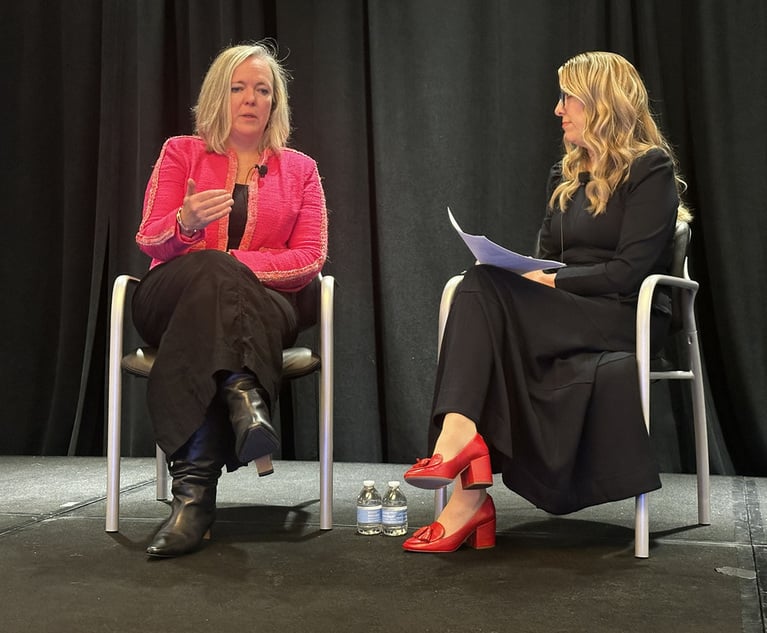DPAs and NPAs Down, but Don't Get Your Corporate Hopes Up
Prosecutors still aren't "pulling a punch in any way," according to Joseph Warin of Gibson Dunn.
January 05, 2018 at 04:16 PM
4 minute read
 Chart Courtesy of Gibson Dunn.
Chart Courtesy of Gibson Dunn.
Last year saw federal prosecutors' use of deferred and nonprosecution agreements with companies drop to their lowest level since 2009, according to a new report from Gibson, Dunn & Crutcher.
But the firm's lawyers still aren't telling their corporate clients to relax.
Why not advise in-house lawyers to chill out? “Because line prosecutors and midlevel supervisors are vigorously pursuing cases. We are not seeing people [prosecutors] pulling a punch in any way,” explained Joseph Warin, chair of the Washington, D.C., office's litigation department and co-chair of the firm's white-collar defense and investigations group.
Warin said his firm has seen no change in direction from prosecutors across any subject area, including environmental, criminal fraud and the Foreign Corrupt Practices Act. “We are still seeing vigorous grand jury subpoenas and [pursuit] of witnesses,” he said.
Still, the number of DPAs and NPAs fell to 22 in 2017 (with none issued by the U.S. Securities and Exchange Commission), from 39 in 2016, the last year of the Obama administration. And that contrast is even more dramatic if you consider 39 was a huge drop from 102 agreements in 2015.
An observer might think the Trump administration's pro-business attitudes are having an impact on the number of agreements. But Warin would strongly disagree.
He said Gibson Dunn employs more than 50 former Justice Department lawyers, including Warin himself, who served as an assistant U.S. attorney in Washington, D.C. “We are a pretty good barometer of retrenchment,” Warin said, and it is not happening.
“I've been doing this since 2001,” he added, “and it ebbs and flows, including with the change of administrations, but we are not seeing a [Attorney General Jeff] Sessions/Trump effect now. I've been at DOJ every day this week,” Warin added. “If they are pulling back, it is not evident to me.”
The Gibson Dunn report described the drop in agreements not as a shift in enforcement policy, but “largely a sign—as it was in 2009—of a new administration in transition and the cyclic nature of prosecution.”
In another section, the report noted two unusual NPAs last year.
Most NPAs and DPAs require a clear acknowledgement by the company that the statement of facts is “true and accurate,” and that the company bears responsibility for the actions of officers, directors, employees and agents acting on its behalf.
But that wasn't true in the DOJ National Security Division's deal with Netcracker Technology Corp., a Massachusetts-based subsidiary of NEC Corp. In that NPA, Netcracker was allowed to expressly deny any criminal wrongdoing related to work done for the National Security Division. The DOJ accused the contractor of not keeping the security of its work at an adequate level.
The U.S. Attorney's Office for the Middle District of Pennsylvania allowed a similar disavowal in a deal with several alcoholic beverage companies accused of providing gifts to members of the Pennsylvania Liquor Control Board. The companies were allowed to deny any criminal liability in their NPAs.
There were several other unusual provisions in the NPA with Netcracker, which was represented by F. Whitten Peters and Steven Cady from Williams & Connolly. They included the fact that there was no fine, a “voluntary” compliance plan that Netcracker agreed to, a clause agreeing not to prosecute the company or any present or former employee, and an arbitration provision activated if there is a disagreement on whether or not there has been a breach of the contract.
“The Netcracker resolution was unique and highly creative,” Warin said. “It ought to say to the marketplace that in unique and unusual circumstances, you may be able to forge a non-template resolution structure.”
The report also discussed changes in white-collar enforcement priorities and their likely impacts on NPAs and DPAs; recent developments in court preservation of privacy for corporate monitor reports; and how other countries are developing their own DPA structure, including the United Kingdom, France and Canada.
This content has been archived. It is available through our partners, LexisNexis® and Bloomberg Law.
To view this content, please continue to their sites.
Not a Lexis Subscriber?
Subscribe Now
Not a Bloomberg Law Subscriber?
Subscribe Now
NOT FOR REPRINT
© 2024 ALM Global, LLC, All Rights Reserved. Request academic re-use from www.copyright.com. All other uses, submit a request to [email protected]. For more information visit Asset & Logo Licensing.
You Might Like
View All
Health Care Giants Sue FTC, Allege Lina Khan Using Loaded Process to Vilify Pharmacy Benefit Managers
3 minute read
Porsche's Venture Capital Arm Adds General Counsel From Clifford Chance

How a 200,000-Worker Global Enterprise Took Down the Silos and Made ESG Its Mission
4 minute read
Corporate Counsel's 2024 Award Winners Performed Legal Wizardry, Gave a Hand Up to Others
Trending Stories
- 1Simpson Thacher Replenishes London Ranks With Latest Linklaters Defection
- 2Holland & Knight, Akin, Crowell, Barnes and Day Pitney Add to DC Practices
- 3Squire Patton Boggs Associate Among Those Killed in String of Methanol Poisonings
- 4Womans Suit Alleging Negligence to Sex Trafficking by Hotel Tossed by Federal Judge
- 5More Big Law Firms Rush to Match Associate Bonuses, While Some Offer Potential for Even More
Who Got The Work
Michael G. Bongiorno, Andrew Scott Dulberg and Elizabeth E. Driscoll from Wilmer Cutler Pickering Hale and Dorr have stepped in to represent Symbotic Inc., an A.I.-enabled technology platform that focuses on increasing supply chain efficiency, and other defendants in a pending shareholder derivative lawsuit. The case, filed Oct. 2 in Massachusetts District Court by the Brown Law Firm on behalf of Stephen Austen, accuses certain officers and directors of misleading investors in regard to Symbotic's potential for margin growth by failing to disclose that the company was not equipped to timely deploy its systems or manage expenses through project delays. The case, assigned to U.S. District Judge Nathaniel M. Gorton, is 1:24-cv-12522, Austen v. Cohen et al.
Who Got The Work
Edmund Polubinski and Marie Killmond of Davis Polk & Wardwell have entered appearances for data platform software development company MongoDB and other defendants in a pending shareholder derivative lawsuit. The action, filed Oct. 7 in New York Southern District Court by the Brown Law Firm, accuses the company's directors and/or officers of falsely expressing confidence in the company’s restructuring of its sales incentive plan and downplaying the severity of decreases in its upfront commitments. The case is 1:24-cv-07594, Roy v. Ittycheria et al.
Who Got The Work
Amy O. Bruchs and Kurt F. Ellison of Michael Best & Friedrich have entered appearances for Epic Systems Corp. in a pending employment discrimination lawsuit. The suit was filed Sept. 7 in Wisconsin Western District Court by Levine Eisberner LLC and Siri & Glimstad on behalf of a project manager who claims that he was wrongfully terminated after applying for a religious exemption to the defendant's COVID-19 vaccine mandate. The case, assigned to U.S. Magistrate Judge Anita Marie Boor, is 3:24-cv-00630, Secker, Nathan v. Epic Systems Corporation.
Who Got The Work
David X. Sullivan, Thomas J. Finn and Gregory A. Hall from McCarter & English have entered appearances for Sunrun Installation Services in a pending civil rights lawsuit. The complaint was filed Sept. 4 in Connecticut District Court by attorney Robert M. Berke on behalf of former employee George Edward Steins, who was arrested and charged with employing an unregistered home improvement salesperson. The complaint alleges that had Sunrun informed the Connecticut Department of Consumer Protection that the plaintiff's employment had ended in 2017 and that he no longer held Sunrun's home improvement contractor license, he would not have been hit with charges, which were dismissed in May 2024. The case, assigned to U.S. District Judge Jeffrey A. Meyer, is 3:24-cv-01423, Steins v. Sunrun, Inc. et al.
Who Got The Work
Greenberg Traurig shareholder Joshua L. Raskin has entered an appearance for boohoo.com UK Ltd. in a pending patent infringement lawsuit. The suit, filed Sept. 3 in Texas Eastern District Court by Rozier Hardt McDonough on behalf of Alto Dynamics, asserts five patents related to an online shopping platform. The case, assigned to U.S. District Judge Rodney Gilstrap, is 2:24-cv-00719, Alto Dynamics, LLC v. boohoo.com UK Limited.
Featured Firms
Law Offices of Gary Martin Hays & Associates, P.C.
(470) 294-1674
Law Offices of Mark E. Salomone
(857) 444-6468
Smith & Hassler
(713) 739-1250






